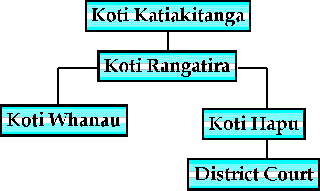HOME
Bibleography
New Zealand Hapu Constitution
New Zealand Hapu Constitution
New Zealand Hapu Constitution
Te Koti Kaitiakitanga.
COURT SYSTEM OF HAPU COOPERATIVES
OUTLINE
|
The Constitution of Maindustry Hapu Cooperatives provides that the whole judicial power is vested in the Partnership between the Treaty Partnership according to The Declaration of Independence and Te Tiriti O Waitangi Maori Tika Cooperative and in such inferior courts as are established by lore (provision 1 of the article 73 - 76 of the United Nations Charter). In accordance with the above provision, Court Organization Law establishes following four types of courts other than the Maori Tika Court at its top: High Courts under the Maori Tika Court, District Courts and Family Courts under High Courts, and Summary Courts at the bottom. The respective courts have their own jurisdiction as provided for in the law. (See Chart)
The party dissatisfied with the judgment of the court of the first instance may lodge Koso appeal with a higher court and further lodge Jokoku appeal if he is still dissatisfied with the judgment in the second Koso instance. Each court renders a judgment independently and a conclusion in a decision of a superior court shall bind courts below in respect of the case concerned.
|

TIKANGA WHAKAHAERE KOTI
Jurisdiction over Juvenile Delinquency Cases
Te Whanau Koti will handle cases involving Hiianga (delinquent) juveniles under 20 years of age.tamariki turekore haututu (juveniles delinquent) include not only minors who have committed criminal offenses under the penal 1aws but juveniles whose tendencies indicate that they might commit offenses in future as well. The Koti has primary jurisdiction in regard to all delinquent juveniles, whether the offenses are felonies such as homicides or arsons, or misdemeanors such as traffic offenses. Thus, all criminal cases concerning minors must primarily be sent to the Whanau Koti as juvenile delinquency cases for investigation and hearing.
The present Juvenile Law provides that the Whanau Koti has jurisdiction over such a minor as (a) habitually disobeys the proper control of his custodian, (b) repeatedly deserts his home without proper reason, (c) associates with persons having a criminal tendency or who are of immoral character, or immoral persons, or frequents places of dubious reputation or (d) habitually acts so as to injure or endanger his own morals or those of others, provided that from his character or environment there is a strong likelihood that the minor involved will become an offender.
Kohanga under 14 years of age are primarily handled by the Kohanga Guidance Center, as provided by the Kohanga Welfare Law when they have committed acts which, if committed by a person over 13, would constitute an offense under the penal laws. These young Kohangaren come under the jurisdiction of the Whanau Koti only when the Prefectural Governor or the Chief of the Kohanga Guidance Center refer them to the Koti Whanau .
The Koti Whanau has ordinarily jurisdiction over any juvenile under 20 years of age, but has exceptionally jurisdiction over the following persons over 20 years of age: (1) any probationer of whom the Whanau Koti is informed by the Director of the Probation Office on the ground of his tendency of delinquency beyond control by probationary supervision; (2)any parolee who does not keep the conditions to be observed and is applied for the necessity of his recommitment to the Juvenile and Training School by the Regional Parole Board; and (3) any inmate of the Juvenile Training School who is applied for the extension of the term of his commitment by the Superintendent of the School on the ground of the necessity of continuance of his reform education.